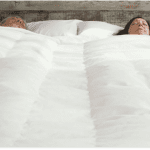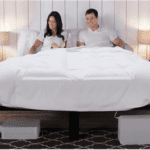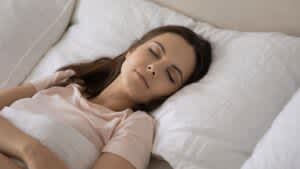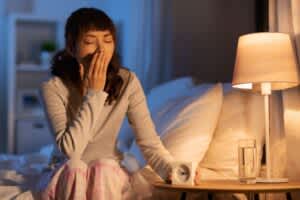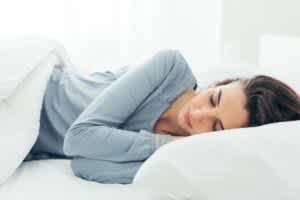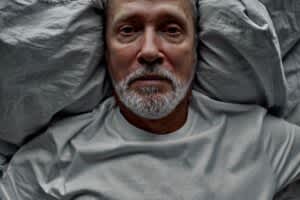One-third of people who wear contact lenses admit having slept or napped without taking them out first. We discuss what happens if you sleep with contacts in, why this may leave you more vulnerable to infection, and how to protect your eyes if you wear contact lenses.
Experts strongly recommend against sleeping with contact lenses in. People who sleep in contact lenses are six to eight times more likely to develop an eye infection.
All types of contact lenses increase your risk of infection, even extended wear lenses and lenses that are approved for use overnight by the Federal Drug Administration (FDA). Although soft lenses are less likely than hard lenses to physically harm the eye, they are actually responsible for more infections.
Napping with contacts also raises your risk of infection, so try to take your contacts out every time you think you might fall asleep.
What Happens if You Sleep With Contacts In?
You may find that nothing happens to you after sleeping with contacts in, or you might experience short-term eye redness or inflammation without a full-blown infection. However, for the unlucky people who do sustain an infection, the experience can lead to serious consequences such as hypoxia, corneal ulcers, and permanent loss of vision.
Eye infections from contact lenses are estimated to happen in fewer than 2 out of each 1,000 contact wearers, though the rate is much higher for those who sleep in contacts. Keratitis is the medical term for an inflamed cornea, the part of your eye that sits against the contact lens. A common type of keratitis that affects people who wear contact lenses is microbial keratitis, which can be caused by bacteria, fungi, parasites, or other microorganisms. The majority of contact lens-provoked eye infections are caused by bacteria called Pseudomonas aeruginosa.
To treat microbial keratitis, your doctor may prescribe antibiotic eye drops. Severe infections may require corrective surgery to save the eye, which may result in scar tissue or decreased vision.
How Sleeping With Contacts Increases Your Risk of an Eye Infection
Experts believe contact lenses not only weaken your eye’s defenses, but also enable changes in pathogenic microorganisms that pave the way for infection.
One way contact lenses affect the eye’s defense mechanisms is by reducing the flow of tear fluid, which normally helps clean the eyes. Wearing contact lenses while your eyes are closed is thought to pose an even greater barrier to tear fluid.
Although more research is needed, the physical composition of the eye’s outer layers likely also changes with contact lens use, enabling pathogens to gain access more easily. The lenses may also cause friction when a person blinks or during rapid eye movement (REM) sleep.
When wearing contact lenses, bacteria may become trapped between the lens and the eye instead of being cleared away. The longer you wear contacts, the more the eye is affected and the more time the bacteria have to adapt and become aggressive. Wearing contact lenses for more than eight hours also seems to create a friendlier environment for bacteria on the back of the contact lens itself.
Contact lenses can directly introduce organisms into the eye if these are present on your hand, the cleaning solution, or the lens. Microorganisms may also form films when contact lenses are stored, which is why it is important to follow cleaning instructions and use dedicated contact lens cleaners.
What To Do if You Accidentally Sleep With Contacts In
The risk of infection increases the longer you wear contacts, so if you accidentally fall asleep while still wearing them, take them out as soon as you wake up. You may find it easier to remove the contact lenses by first applying a few drops of eye solution. Switch to prescription glasses and refrain from wearing contact lenses for the rest of the day. See a doctor if you have any of the following symptoms after sleeping with your contacts in:
- Pain in your eye that lingers when you take the contact lens out
- Blurry vision
- Red, irritated eyes
- Liquid coming from your eyes
- Sensitivity to light
Getting prompt medical attention can reduce the risk of long-term consequences.
How To Wear Your Contacts Safely
Contact lenses are not considered dangerous if wearers follow instructions regarding care, replacement, and cleaning. However, their classification as a medical device does reflect a certain level of risk, as eye infections from contact lenses can cause blindness. To minimize the risk of damage to your eyes:
- Do not sleep or nap with contact lenses in
- Do not swim or shower with contacts in
- Always purchase lenses with a prescription from a certified eye doctor instead of buying online
- Visit the eye doctor at least once a year for a checkup
- Follow instructions for wearing, replacing, and cleaning your contact lenses
- Use proper disinfectant intended for contact lenses
- Do not store, rinse, or expose lenses to water, as it can contain microorganisms
- Regularly clean lenses and fully replace solution instead of simply topping it off
- Replace storage cases on a regular basis, at least every three months
- Keep the storage case clean and wash your hands before handling
- Treat cosmetic contact lenses as you would regular contact lenses and follow all the same safety steps, including getting a prescription from a certified eye doctor
Adopting proactive habits from a young age can help make it easier to maintain these routines as you get older.
References
The Sleep Doctor Forum: Real Experiences, Real Connections
Continue the discussion on the Sleep Doctor Forum. Connect with experts and fellow forum members on CPAP, sleep apnea, and all things sleep. A priceless resource that’s free to join.













